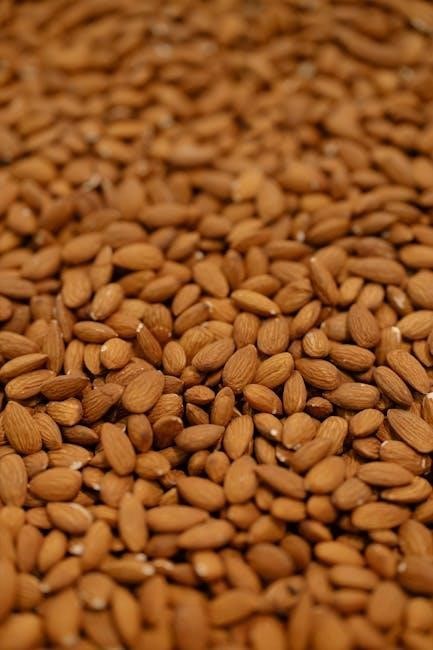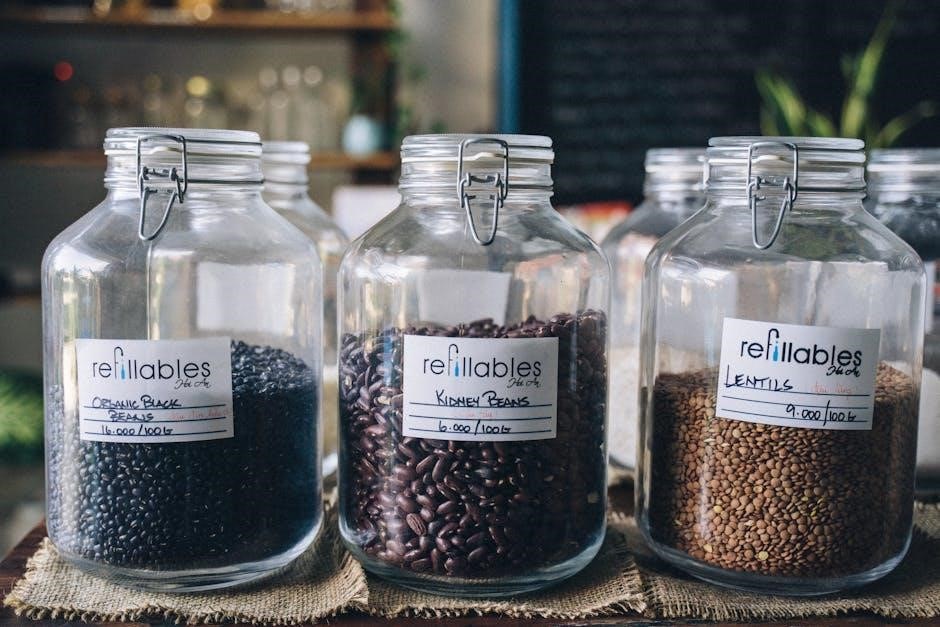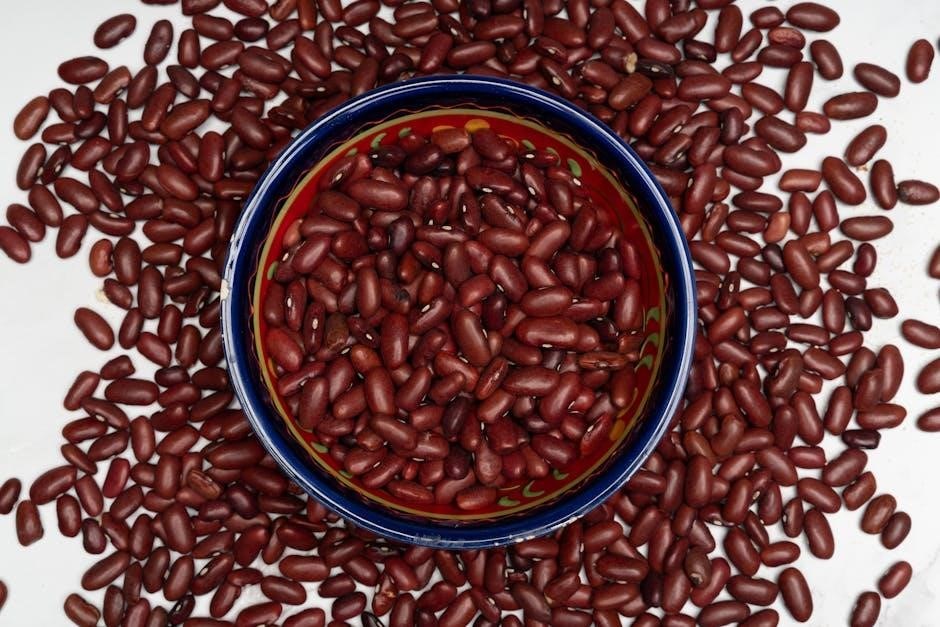A zero-carb diet focuses on eliminating carbohydrates entirely, emphasizing protein-rich foods, healthy fats, and low-carb vegetables. It aims to promote weight loss, improve blood sugar control, and enhance overall health by reducing insulin levels and increasing fat burning. This approach is particularly popular among those following ketogenic or carnivore diets. By understanding zero-carb foods, individuals can make informed choices to achieve their dietary goals effectively.
Understanding the Benefits and Importance of Zero-Carb Foods
Zero-carb foods are essential for those seeking rapid weight loss, improved blood sugar control, and enhanced mental clarity. By eliminating carbohydrates, the body transitions into ketosis, a metabolic state where fat is the primary energy source. This shift reduces insulin levels, promoting fat burning and suppressing hunger. Zero-carb diets are particularly beneficial for individuals with type 2 diabetes or those prone to metabolic syndrome. The focus on whole, nutrient-dense foods like meats, fish, and vegetables ensures optimal nutrition while minimizing empty calories. This approach fosters a healthier relationship with food, encouraging long-term lifestyle changes for better overall well-being.

Meat and Poultry
Meat and poultry are ideal zero-carb options, providing essential protein and nutrients. Beef, chicken, turkey, and pork are rich in iron and B vitamins, supporting overall health.
- Beef (grass-fed for higher quality)
- Chicken breast and thighs
- Turkey (ground or whole)
- Pork ( chops, tenderloin, or ground)
Choose organic, grass-fed, or pasture-raised options to avoid added sugars and preservatives, ensuring a pure zero-carb intake for a healthier lifestyle.
Zero-Carb Options: Beef, Chicken, Turkey, and Pork
Beef, chicken, turkey, and pork are excellent zero-carb protein sources, offering essential nutrients like iron, zinc, and B vitamins. Grass-fed beef is rich in omega-3 fatty acids, while chicken breast provides lean protein. Turkey is versatile and low in saturated fat, and pork offers a flavorful, nutrient-dense option.
- Beef: Opt for grass-fed, lean cuts like sirloin or ribeye for higher quality and fewer carbs.
- Chicken: Choose organic, free-range chicken breast or thighs for maximum nutrition.
- Turkey: Ground or sliced turkey breast is a great source of lean protein.
- Pork: Pork chops, tenderloin, or ground pork are versatile and carb-free.
Avoid processed meats and opt for fresh, organic options to ensure a pure zero-carb intake and maximize health benefits.

Fish and Seafood
Fish and seafood are excellent zero-carb options, offering high-quality protein and essential nutrients; Choose fatty fish like salmon or tuna for added health benefits.
Low-to-No-Carb Choices: Salmon, Tuna, Shrimp, and More
Fatty fish like salmon and tuna are rich in omega-3 fatty acids, while shrimp and mackerel offer lean protein. Sardines and anchovies are also excellent choices, packed with nutrients. Crab and lobster are zero-carb options, ideal for adding variety. These seafood selections are naturally low in carbohydrates, making them perfect for a zero-carb diet. They provide essential fatty acids and protein, supporting overall health and satiety. Incorporating these into meals ensures a balanced and flavorful diet without compromising on nutrition or taste.
- Salmon: High in omega-3s and protein.
- Tuna: Low in calories, high in protein;
- Shrimp: Lean and versatile.
- Mackerel: Rich in healthy fats.
- Sardines: Packed with nutrients.
- Crab and lobster: Luxurious zero-carb options.
These choices are ideal for maintaining a zero-carb lifestyle while enjoying delicious and nutritious meals.
Vegetables
Low-carb vegetables like broccoli, cauliflower, leafy greens, asparagus, and zucchini are excellent choices. They are rich in nutrients and fiber, making them ideal for a zero-carb diet.
- Broccoli
- Cauliflower
- Leafy greens
- Asparagus
- Zucchini
Low-Carb Vegetables: Broccoli, Cauliflower, and Leafy Greens
Broccoli, cauliflower, and leafy greens are excellent low-carb options, rich in nutrients and fiber. These vegetables support a zero-carb diet by providing essential vitamins and minerals without excess carbohydrates. Broccoli contains only 5 grams of carbs per cup, while cauliflower offers a similar low-carb profile, making it ideal for substituting high-carb foods like rice or potatoes. Leafy greens, such as spinach, kale, and lettuce, are even lower in carbs, with less than 2 grams per cup. These vegetables are versatile, suitable for salads, stir-fries, or as side dishes, and they help maintain a balanced and nutritious zero-carb lifestyle.
- Broccoli: 5g carbs per cup
- Cauliflower: 5g carbs per cup
- Leafy greens: <2g carbs per cup

Dairy and Eggs
Zero-carb dairy options include cheese, eggs, and full-fat dairy products like butter and cream. These foods are rich in nutrients and healthy fats, supporting a low-carb lifestyle effectively.
Zero-Carb Dairy Products: Cheese, Eggs, and Full-Fat Dairy
Cheese, eggs, and full-fat dairy are excellent zero-carb options, offering essential nutrients and fats. Eggs provide high-quality protein and vitamins, while cheeses like cheddar and mozzarella are low in carbs. Full-fat dairy products, such as butter and heavy cream, add healthy fats without the carb content. These foods are versatile, supporting a variety of recipes and meal plans. Incorporating them into a zero-carb diet ensures adequate nutrition while maintaining dietary restrictions. Always choose unprocessed, whole dairy products to avoid hidden carbs and additives.
Fats and Oils
Fats and oils are essential for a zero-carb lifestyle, providing energy and supporting overall health. Avocado oil, olive oil, and coconut oil are excellent choices, offering healthy fats perfect for cooking or dressings while adhering to a no-carb diet.
Healthy Fats: Avocado, Olive Oil, and Coconut Oil
Healthy fats are crucial for a zero-carb diet, providing energy and supporting overall health. Avocado oil is rich in monounsaturated fats, perfect for cooking or dressings. Olive oil, known for its antioxidants, is ideal for Mediterranean-inspired dishes. Coconut oil offers versatility in baking and sautéing, with its medium-chain triglycerides (MCTs) aiding metabolism. These fats are keto-friendly and enhance flavor without adding carbs. Incorporating them into meals ensures a balanced and satisfying diet, aligning with zero-carb principles and promoting long-term well-being.

Beverages and Alcohol
Zero-carb beverages include water, unsweetened coffee, and tea. For alcohol, opt for low-carb options like bourbon, brandy, or dry wine in moderation, ensuring they fit your dietary goals.
Zero-Carb Drink Options: Water, Coffee, and Low-Carb Alcohol
Staying hydrated is crucial on a zero-carb diet. Water is the best choice, with no calories or carbs. Unsweetened coffee and tea are also excellent options, providing antioxidants without added sugars. For alcohol, low-carb choices like bourbon, brandy, and dry wines are suitable in moderation. Avoid sugary mixers and flavored spirits, as they often contain hidden carbs. Always check the carb content of any beverage to ensure it aligns with your dietary goals. Making informed choices helps maintain ketosis and supports overall health on a zero-carb lifestyle.

Reading Food Labels
When following a zero-carb diet, always check the food label for total carbohydrates, serving size, and hidden carbs. Avoid products with added sugars or artificial sweeteners to stay compliant and achieve your dietary goals effectively.
How to Identify Carb Content and Make Informed Choices
Reading food labels is crucial for a zero-carb diet; Always check the “Total Carbohydrates” section to ensure the food aligns with your dietary goals. Pay attention to serving sizes, as carbs can add up quickly. Look for hidden carbs in processed foods, such as added sugars, starches, or artificial sweeteners. Opt for products with fewer ingredients and no added sugars. Use a carb calculator or food list to verify the carb content of unpackaged items like meats and vegetables. This practice helps you avoid unintentional carb intake and maintain compliance with your zero-carb lifestyle.

Practical Tips for a Zero-Carb Lifestyle
Plan meals in advance, use a grocery list, and prep ingredients to avoid last-minute carb-heavy choices. Stick to whole, unprocessed foods and avoid hidden carbs in sauces and condiments.
Meal Planning, Grocery Shopping, and Avoiding Hidden Carbs
Plan meals weekly to avoid impulsive carb-heavy choices. Use a grocery list to focus on whole foods like meats, fish, and low-carb vegetables. Avoid processed items, as they often contain hidden carbs. Always read food labels to identify sneaky sources of carbohydrates in sauces, condiments, and snacks. Opt for fresh, unprocessed options to maintain a zero-carb lifestyle. Consider using a printable low-carb food list to guide your shopping and meal prep. This approach ensures consistency and helps avoid common pitfalls, keeping your diet on track and carb intake minimal.
A zero-carb lifestyle offers significant health benefits, including weight loss and improved blood sugar control. Focus on nutrient-dense foods to maximize results and maintain long-term success.
Maximizing the Benefits of a Zero-Carb Diet with the Right Foods
Embracing a zero-carb diet requires careful selection of nutrient-dense foods to ensure optimal health and weight management. Prioritize high-quality meats, fish, and eggs, which are rich in protein and essential nutrients. Incorporate healthy fats like avocado, olive oil, and coconut oil to support energy production and satiety. Low-carb vegetables such as broccoli, cauliflower, and leafy greens provide vital vitamins and fiber without excess carbohydrates. Avoid processed foods and hidden carbs, focusing instead on whole, unprocessed ingredients. By making informed choices, you can maximize the benefits of a zero-carb lifestyle, achieving both weight loss and improved overall well-being effectively.



